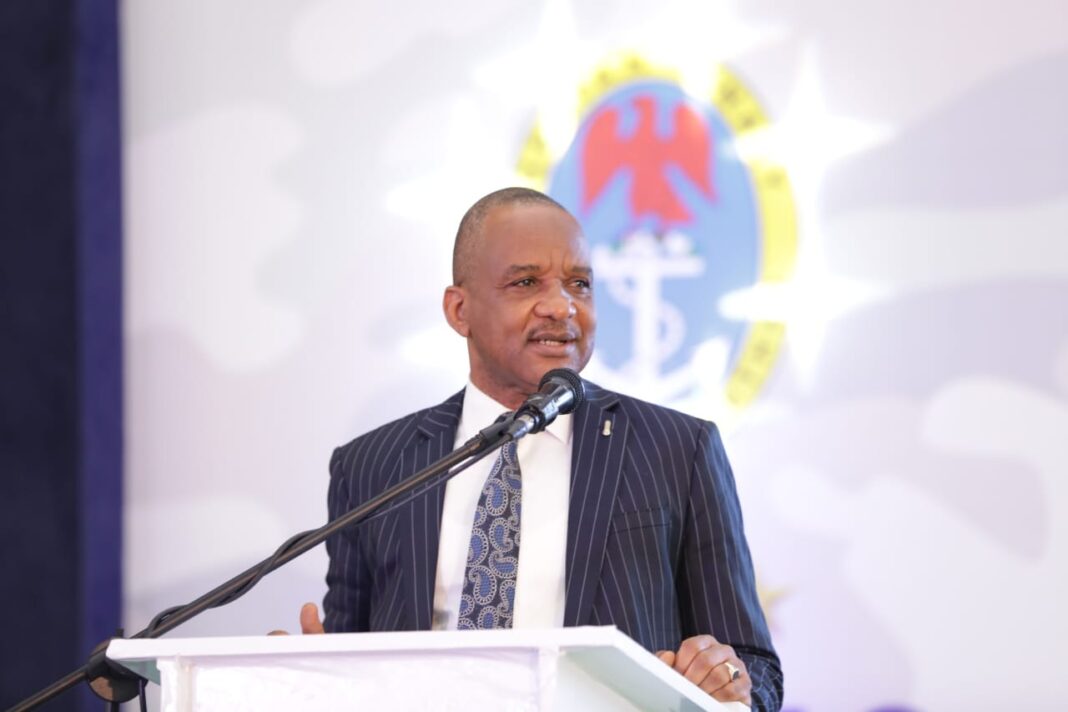The Director-General of Nigerian Maritime Administration and Safety Agency (NIMASA), Dr. Bashir Jamoh has restated the need for enhanced stakeholder collaboration in tackling maritime security in Nigeria and the Gulf of Guinea.
Dr. Jamoh made this call in his paper titled “Enhancing Collaboration amongst Maritime Stakeholders for Improved Maritime Security in Nigeria” which he presented at the 2021 edition of the Chief of the Naval Staff Annual Conference (CONSAC) which was held at the Coronation Hall of the Kano State Government House.
The NIMASA DG observed that despite the potentials of the Maritime sector in the areas of job creation, revenue generation, and its vital role in facilitating more than 90% of world trade through shipping, the sector is undermined by maritime insecurity. He further stated that “The economic cost of maritime insecurity is very pronounced in Nigeria compared to other countries. While the economic cost of piracy activity in Asia was estimated at $4.5 million (as of 2016), the estimated economic cost of maritime insecurity in the GoG was about $793.7 million”
The NIMASA DG identified the sources through which insecurity leads to loss of revenue in the maritime sector as Ransoms, Insurance Premiums, Re-Routing Ships, Security Equipment, Losses to Oil, and Fishing Industry, Cost of Security Escort. “Studies have identified the following factors as the drivers of maritime insecurity in the region. They include an increase in ship traffic as a result of globalization; the debilitating leadership of many of the states in the region; the proliferation of small arms; the poor monitoring and control of the oceans; and criminality, which have been further aggravated by visible youth unemployment, high level of poverty, and economic hardship. The impact of these challenges is far-reaching and requires that all concerned should collaborate to tackle this menace.” Dr. Jamoh stated.
Drawing examples from other climes like the Regional Cooperation Agreement on combating Piracy and Armed Robbery against Ships in Asia (ReCAAP), the NIMASA boss showed that stakeholder collaboration has been used to tackle Maritime Insecurity
The NIMASA boss pointed out the five clusters of Nigerian Maritime collaboration as the Armed Forces/National Security Group (Army, Navy, Air Force etc); Non-Military Services (Customs, Police, Immigrations, NDLEA etc); Agencies with Incidental Functions (NAFDAC, NNPC, DPR, etc); Regulatory Agencies (NIMASA, NESREA, NOSDRA, NIWA etc); and the Disaster Management Agencies (NEMA).
Dr. Jamoh listed some collaborative efforts by the agency to address maritime insecurity to include, the implementation of the Deep Blue project; the enactment of the Suppression of Piracy and other Maritime Offences (SPOMO) Act 2019; community engagements; strengthening of the Navies of the Gulf of Guinea (GoG) region; collaboration with CEOs of Maritime Industry Organisations known as the Joint Maritime Industry Working Group (JMIWG); engagements with security forces (Nigerian Navy, Army, Airforce, Police, Customs, Immigration); and the Gulf of Guinea-Maritime Collaboration Forum/Shared Awareness and Deconfliction (GoG-MCF/SHADE). He further stated that NIMASA is working closely with the International Maritime Organization (IMO), INTERPOL, regional organizations, shipping operators, as well as private security companies, submarine cable operators, and seafarers’ organizations.
The DG NIMASA calls for the deployment of more resources for technical assistance for capacity building and expansion of automation systems for monitoring the maritime sector that will enhance the nation’s capacity for cooperation against trans-national maritime crime and terrorism as well as, adoption of participatory approach to maritime security.
“Working together is therefore a most vital approach to defend our seas, enhance maritime security, promote trade, protect the environment, and guarantee the quality of life of our people.” Dr. Jamoh concluded.


